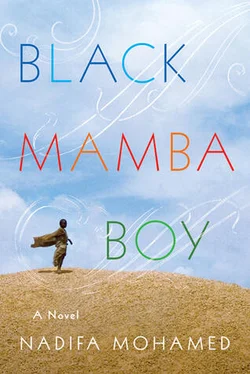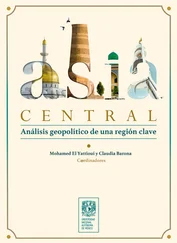Jama laughed with sadistic mirth. He took the glass and placed it gently, deferentially in front of the gangly Italian; “For you, signore.”
The Italian raised an eyebrow, “Well, I guess he does recognize me after all.” He drained the amber filth down his throat in a few long gulps and Jama felt a pang of unexpected guilt at the sight.
The last few Italians were clearing out of the teahouse and hungry askaris waited under the shade of a dying acacia. Jama kept away from the gangly Italian after handing him the dirty drink, he hadn’t even told the other boys what he had done. Jama felt a hand on his shoulder and jumped when he saw the man looming over him.
“Thank you for the drink, it was kind of you,” the Italian began. His lips were wet and Jama turned his face to the side fearing his breath. “You Somali or Eritrean? I still can’t tell yet.”
Jama drew a shape in the sand with his big toe. “Somali,” he mumbled.
“You speak Italian? You after a job?”
Jama shook his head and carried on looking toward the side; he had seen and heard from askaris the value of keeping your distance from the Italians.
“Suit yourself, but the offer is open if you want it,” said the Italian with a shrug. His black-haired, long fingers felt in his breast pocket and emerged holding delicate wire-framed glasses. Jama watched from the corner of his eye as the fingers fumbled and placed the beautiful glasses on his too-long nose. Jama coveted them. It looked as if a metal-and-glass butterfly had decided to spread its translucent wings across the hard, bony face, giving the Italian a kinder, more thoughtful appearance. With his second pair of eyes in place the Italian strolled off, acknowledging the salutes of the askaris with a loose salute of his own.
After that day Jama watched the Italian. The Fascist legs splayed open in languorous authority, the booted feet playing with each other, crushing beetles underfoot with a satisfying crunch. Jama’s legs were stiff, tired poles compelled to keep moving, his feet so dry, gray, hard he could barely feel the ground underneath them. The Italian clinked a beer bottle against his friend’s. Jama collected glasses from the broken tables. More and more Fascists and askaris were being sent to fight the guerrillas, and the teahouse had a portentous, melancholy atmosphere. The Ethiopian Arbegnoch were a menace to the Italians; they overran forts, ambushed checkpoints, invaded garrisons. The army of ghosts in white shammas was impossible to fight; with the mournful faces of Coptic saints, the patriots skewered Italians on homemade bayonets. They materialized and vanished as if they had wings under their homespun cotton. Near Omhajer, the famous Abyssinian fighter Abraha and his men in their lion skins stalked the Italians, and like lions they picked off the last man or the last vehicle in a convoy. The trees hid them, the leopards warned them, the wind swept away their footprints.
A few askaris returned to Omhajer to report back on the front, where the Italians had turned against their own askaris when they could not catch the spectral Abyssinians. One man had seen the Italians force askaris to lie down one on top of another in the muddy water of a narrow river so they could cross along their backs, the men at the bottom drowning, murky water gurgling down their throats.
In this dangerous climate, a few of the lazier boys had been let go, but Jama had held on to his job. The gangly Italian and his stumpy friend got up and stretched out their arms, yawning with afternoon ennui as they picked up their rifles. The other Italian had dark patches of sweat growing out of his armpits, groin, and back.
“Waryaa! Hey, you,” shouted the tall Italian at Jama in heavily accented Somali. “We are going hunting, come and collect what we shoot, there will be a few coins in it for you.”
Jama walked over to the cook, who was standing on the veranda, a cigarette in his hand, and piled all the glasses at his feet.
“I’m off now, I might earn some real money with these Italians,” said Jama as the glasses tumbled against one another with a soft tinkling. The cook took a deep drag on his cigarette and smoke drifted from his nostrils. “Keep your wits about you, Jama. Run away if they start behaving strangely, or you might return as one of their wives.” The cook pursed his lips and blew out a long plume of smoke. “Seriously, be careful, Jama.” The cook winked before putting out the cigarette with his calloused bare foot and padding back to the kitchen.
They walked in line across the Eritrean plains, Jama slowing down to maintain the requisite distance behind them. The shorter Italian was breathing heavily and going red in the heat, a black swipe of hair plastered to his forehead. “This little boy reminds me of my greyhound, both long, lean, black. God, I miss that dog, he knew me better than anyone,” he puffed. “Might be dead by the time we get home. Poor Alfredo, he had problems pissing when I left. I’ll never find a dog like him again.”
The tall one didn’t respond, but took off his glasses to wipe condensation from them.
“Are you a dog man, Lorenzo? City boys never truly understand animals like we do, it’s about understanding what their eyes are telling you, you have to know what an animal needs better than he does. Look at this little black face with us. If we told him to walk over there, he would do it, because he knows that we know better than him.” He stopped to take a swig from his water flask.
Lorenzo stopped ahead of him and took a gulp as well. Jama looked away to hide his thirst but the tall Italian walked over to him and thrust his flask into his hand.
Jama drank, wiped the top of the flask with his sarong, and handed it back to the tall Italian with a small nod of thanks. Jama’s grasp of Italian was sketchy but he understood that these two soldiers were fighting their own private battle. Their arms moved all the time and they threw out their words as if they were grenades. With their fast rat-a-tat speech and whirring arms, they seemed as mechanical as all the other things the Ferengis had brought to Eritrea.
They carried on marching. The grass was high and rustled against their legs as they passed, crickets made small talk within it, birds sunbathed stock-still on branches. Jama noticed a venue of vultures flying overhead, following an imperceptible trail of death. The Italians were after big game, zebras, leopards, maybe one of the few elephants still left in Eritrea, anything to boast about back home. They walked and walked, unable to see anything bigger than a rat.
The short Italian, drenched in sweat and frustration, threw his hands up. “Enough! Enough walking! Let’s stop. We’ll just shoot what we find.”
Lorenzo looked around, there was nothing, just yellow grass and blue sky. “We’ve walked this far, Silvio, why stop now? Near a stream there would be better game,” he reasoned, still walking on ahead with Jama a respectful distance behind him.
“No, no, absolutely not, I am stopping here, tell Alfredo to scare up the birds or something,” panted Silvio. Lorenzo sighed and gave Jama his instructions.
Jama gingerly walked up to a spindly tree and gave its trunk a gentle shake. Nothing stirred. “What’s he doing? Tell him to make some goddamn noise,” barked Silvio with growing irritation.
“Make noise, run around,” said Lorenzo in Somali. Jama felt stupid but he ran around, yelled out, kicked at the grass, beat the scrubby bushes with a stick. A few sleepy birds rose drowsily off their nests and flew straight into a volley of rifle shots, their proud chests blown into a cloud of feathers.
“More, more!” shouted Lorenzo. Jama whooped and swooped.
“That big tree over there now, throw stones at it,” said Lorenzo. Jama ran over to it and did as he was told. A large shape shifted behind the leaves, a leopard hiding in the branches, its ears on end. Jama leaped back and pointed into the foliage. The leopard came scrambling down the trunk, its muscular back gold and black. Lorenzo and Silvio fired shot after shot, but the leopard sprang out of range, just a shadow in the long grass.
Читать дальше
Конец ознакомительного отрывка
Купить книгу












